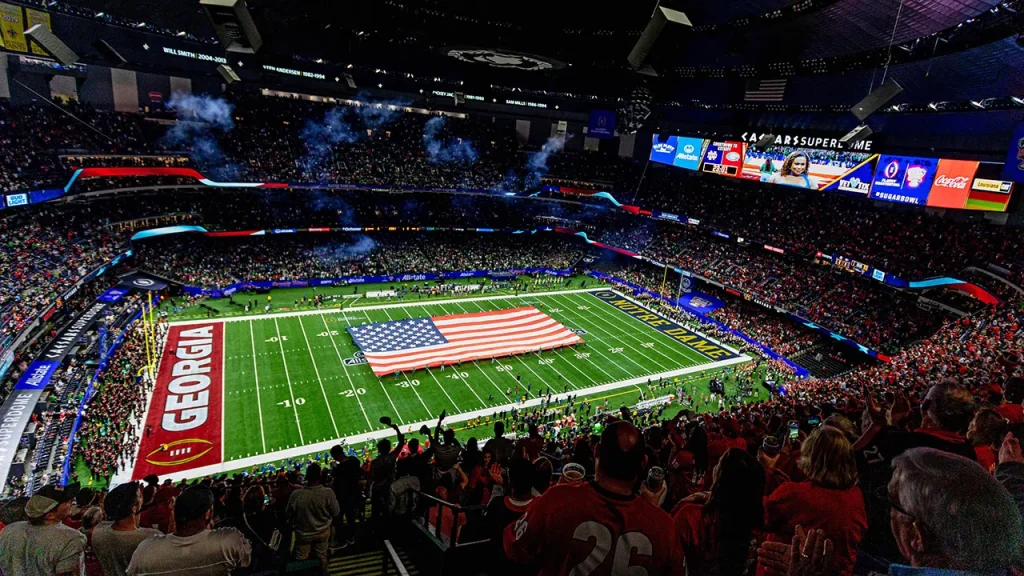The Sugar Bowl, a prominent college football playoff quarterfinal game, became a stage for a poignant display of national unity and resilience in the face of tragedy. Just days prior, the city of New Orleans had been struck by a horrific act of terrorism on New Year’s Day when a truck plowed into a crowd on the iconic Bourbon Street, leaving a trail of casualties and injuries. This devastating event cast a long shadow over the highly anticipated sporting event, prompting its postponement and raising concerns about security. However, the game ultimately proceeded, transforming into a symbol of defiance against terror and a testament to the enduring spirit of the American people. Before the clash between Notre Dame and Georgia at the Caesars Superdome, the stadium fell silent in a solemn tribute to the victims of the attack. This moment of reflection was followed by a spontaneous eruption of patriotic fervor as the crowd broke into resounding chants of “U-S-A!” The emotional outpouring underscored the nation’s resolve to stand united in the face of adversity and to honor those affected by the senseless violence.
The singing of the national anthem, accompanied by a massive American flag draped across the field, further amplified the atmosphere of patriotism and solidarity. The pre-game ceremonies served as a powerful reminder of the shared values and national identity that bind Americans together, especially during times of crisis. The New Orleans Saints and Pelicans, the city’s professional sports teams, also announced that a member of their video production team was among those killed in the attack, further deepening the emotional resonance of the event. The tragedy touched the entire community, extending its reach beyond the realm of sports and highlighting the vulnerability of innocent lives in the face of such senseless violence.
The terrorist attack on Bourbon Street had immediate and significant ramifications, forcing the postponement of the Sugar Bowl and triggering a heightened state of security throughout New Orleans. Authorities meticulously reassessed and reinforced security measures to ensure the safety of players, attendees, and the city as a whole. Bourbon Street, typically bustling with activity, remained closed until just hours before the game. Louisiana Governor Jeff Landry, present at the game, emphasized the stringent security precautions implemented, assuring the public that the Superdome was secure and that federal resources were being deployed to investigate the incident thoroughly. The heightened security presence served as a stark reminder of the ongoing threat and the need for vigilance.
The impact of the attack extended beyond logistical and security concerns, touching the very core of the teams and their preparations. Notre Dame head coach Marcus Freeman addressed the tragedy directly with his team, acknowledging the emotional toll and emphasizing the importance of unity and support during such challenging times. He highlighted the crucial role of a strong culture, both within a team and within a nation, in navigating moments of adversity. His message underscored the need to rally around the city of New Orleans and provide comfort and support to the victims and their families. Freeman’s words reflected a broader sentiment of empathy and resilience in the face of tragedy.
The Sugar Bowl, initially overshadowed by the tragic events on New Year’s Day, ultimately became a testament to the resilience and unity of the American spirit. The patriotic fervor displayed by the fans, the heartfelt tributes to the victims, and the heightened security measures all reflected the nation’s determination to persevere in the face of adversity. The game itself transcended its sporting significance, becoming a symbol of hope and a reminder of the shared values that bind a nation together. The event demonstrated that even in the darkest of times, the human spirit, fueled by patriotism and compassion, can find a way to shine through.
The Sugar Bowl also served as a microcosm of the nation’s response to tragedy. The initial shock and grief gave way to a collective resolve to honor the victims, support those affected, and ensure that such senseless acts of violence would not define or diminish the spirit of the community. The game became a platform for expressing solidarity, fostering resilience, and demonstrating the enduring power of shared values. It underscored the importance of unity and compassion in overcoming adversity and rebuilding in the aftermath of tragedy. The event reminded everyone that even in the face of profound loss, the human spirit, fortified by a sense of community and national pride, can find strength and inspiration to move forward.

